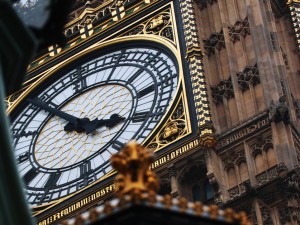
A wheel comes off
It was not only Esteban Gutierrez at the Malaysian grand prix that lost a wheel at the weekend. One of sterling’s came off in an equally comprehensive manner when the prime minister delivered her introductory speech at the Conservative party conference in Birmingham. Like that of Mr Gutierrez the penalty did not hit immediately but when the Far East opened for business on Monday sterling began to head lower. It fell further when London got going and was under pressure again this Tuesday.
Over the last seven days the pound fell by an average of -0.8%, most of that loss taking place on Monday. It is down by a net two thirds of a euro cent, two Australian and NZ cents and two and a half Canadian cents. This Tuesday it traded at its lowest level in 31 years against the US dollar.
May’s uncertainty principle
It her keynote speech Ms May reassured her audience that the government has not forgotten bout Brexit or put it on the back burner. She confirmed that the Article 50 process for leaving the EU will be kicked off by the end of March. It will not be a hard Brexit, nor a soft one because the PM dislikes both expressions. But she gave the impression it would not be a particularly nice one either.
The good news
Brexit still means Brexit
The bad news
The government will provide no “running commentary” on the exit process, leaving investors to guess where it is heading. That will encourage the leaders of the other 27 EU states to fill the information vacuum with their own, perhaps biased, narrative. Such a situation is unlikely to benefit sterling.
Oil fires Loonie
An unexpected announcement that OPEC had agreed to putting a cap on oil production was, not unreasonably, positive for the price of oil. It was also positive for the currencies of oil exporters. Norway’s krone was the biggest beneficiary, rising 2.4% in the week. The Canadian dollar took second place with a gain of 1.4% against the pound.

Central bankers
Since their return from the summer holidays central bankers have been popping up all over the place. The Federal Reserve chairperson visited Congress to spend three hours dodging questions on the timing of the next interest rate increase.
The European Central Bank president took part in what the ECB drily described as an “exchange of views” with the Bundestag in Berlin. The Bundestag’s view was that sub-zero interest rates are crucifying savers and banks: Sig. Draghi’s view was that Germans are actually doing quite well from the ECB’s ultra-relaxed policy. He was adamant that negative rates are not responsible for the troubles of the German banking system.
Among the Federal Reserve worthies offering their opinions was Cleveland Fed president Loretta Mester, one of the three committee members who voted for an increase last month. She wanted investors to believe there is a chance of an increase at next month’s meeting despite the election that takes place a few days later. Her colleagues may be less keen on making a move that could look politically loaded.
More US jobs
Although the Federal Reserve claims to have overcome its obsession with employment statistics it still says monetary policy decisions will be “data-dependent” so Friday’s jobs numbers will be as important as ever. Analysts expect the increase in nonfarm payrolls to have been around 170k in September, rather less than the 182k monthly average in the year to date. A weaker number would make a November rate increase even less likely.
Sarah, Senior Account Manager at Moneycorp
Moneycorp is one of the largest international payment companies supporting over 90 currencies. Last year Moneycorp traded over £22.6 billion worth of international money transfers. Find out how Moneycorp can help you with your international transfer here.






